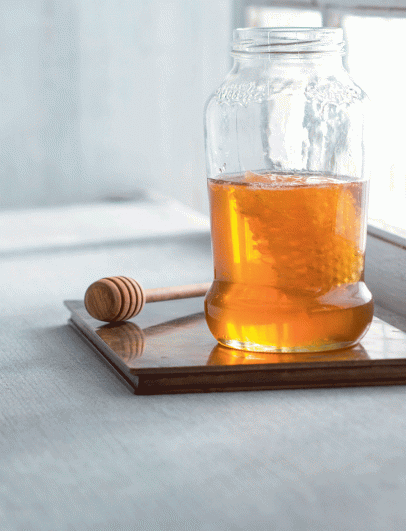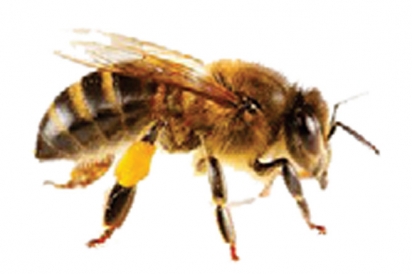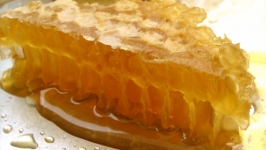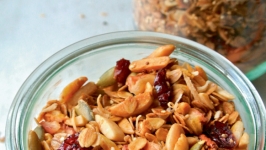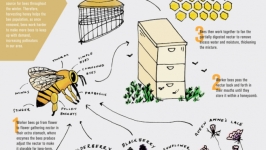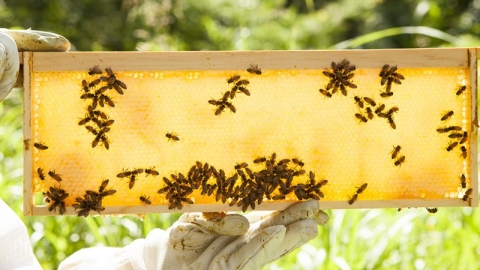The Myth And Magic Behind Local Honey
When it comes to promoting health and fighting disease, perhaps no food is more “golden” than honey. Today honey appears in everything from facial scrubs to candles to lip balm to cough drops to your daily coffee drink. The number of backyard beekeepers has grown exponentially in recent years. Honey is just as likely to appear from your neighbor's yard as the farmer's market. But does honey deserve its healthy halo? Depending on whom one asks, that can be a sticky subject.
Gene Armstrong, president of the Nashville Area Beekeepers Association, certainly knows his honey. And according to him, “there’s science and there’s wishful thinking, and the two don’t always overlap. “I’ve got to ride the middle ground on this issue,” Gene comments, “because many of our members (there are some 500), believe that bees and their products are practically a panacea. For example, many strongly believe that bee stings provide a therapeutic benefit for people with arthritis. Well, I have arthritis, get stung regularly, and can’t say that there is any personal benefit. To the best of my knowledge, there is no scientific evidence for this hypothesis.”
Bee Pollen
According to Jay Williams, most bee pollen you buy in a jar is dehydrated from honey. But unless it's fresh bee pollen, it doesn’t have the beneficial properties. Look for fresh local bee pollen at the farmers market and from local bee keepers.
Perhaps no science, but there sure is anecdote. Jay Williams, founder of Williams Honey Farm in Williamson County, knows this first hand. Literally. “I get stung on a regular basis and notice that my hands are much more flexible afterwards. I’m also more energetic. In fact, if I don’t get stung, I sort of miss it.”
When asked about the best honey for warding off allergies, Jay is clear: “You want it cloudy.” This means it contains a lot of pollen. And pollen is crucial. If the pollen is not there, then everything else fails, including protection from allergies.” Honey has not been scientifically proven to help allergies, but many people swear by it.
Carol Hagen, proprietor of Queen Bee Pollinators here in town, has seen many people overcome debilitating allergies after beginning a daily regime of bee pollen and raw honey. In fact, she herself suffered from serious allergies. “I took shots for decades,” she says, “but they weren’t working. I was sick all the time. But, about five years ago, I became a beekeeper and began a daily intake of raw honey and pollen. It’s been life changing. I no longer suffer from my allergies.” This time of year, wildflower honey, which is pollinated from wildflowers all year long is the most popular.
Despite their clear differences about apitherapy, Gene and Jay are certainly correct on one point: surprisingly little science has been done on the effectiveness of honey on health. For example, Dr. Peeble Stokes, head of Vanderbilt’s allergy clinic, found only one controlled study on the effectiveness of honey on allergies. Conducted at the University of Connecticut, the study took patients with allergic rhinitis (inflammation caused by the common cold or allergies) and randomized them in three groups: one group received locally collected, unpasteurized, unfiltered honey; another group nationally collected, filtered, and pasteurized honey; the last group corn syrup with synthetic honey flavoring. Each patient consumed one tablespoon per day and maintained a diary tracking ten subjective allergy symptoms. The result? Neither honey group experienced any statistically meaningful relief from their symptoms beyond the placebo group.
So, does that mean that raw, unfiltered honey is just a placebo? Not at all. Honey clearly has medical benefits. “It’s a definitely an antimicrobial,” Gene points out. “Clinical studies have confirmed its antibacterial and antifungal properties. Even today, in China, honey is the primary antibacterial agent for topical use.”
As for others, Carol says that, in her experience, raw honey helps about three-quarters of allergy sufferers. “After about two weeks, people will come visit me at the Nashville Farmers’ Market” – the place where Carol and her sweet products can be found year-round – “and give me a big hug and say, ‘I haven’t felt this good in years.’”
Carol recommends beginning the raw honey and bee pollen regimen in the winter. “If you’ve been eating it all winter long, you have built up resistance. Start off with wildflower honey and see if that works for you.”
Whether honey has healthful benefits or not is questionable, but one thing is clear, according to Gene Armstrong, our food supply and system of agriculture are highly dependent on pollinating insects. One third of what we eat depends on bees. And bees are one of the best solutions to feeding the planet.


